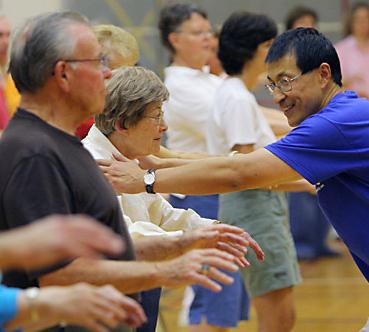Workout may help cancer patients

Weimo Zhu, associate professor in kinesiology and community health, corrects participants in a qigong exercise on Thursday night at Freer Hall. Zhu led a workshop of healthy living through qigong over the weekend. Laura Prusik
October 8, 2007
Harry Zanotti, a 63-year-old Urbana resident, was diagnosed with colon cancer in April and started radiation and chemotherapy shortly after.
Zanotti said he developed serious side effects after only three weeks of chemotherapy. After his weight dropped about 20 pounds, he decided to stop chemo and turn to qigong, an ancient type of Chinese medicine. One doctor’s response to his decision: “I’ll pray for you,” Zanotti said.
“Chemo has that effect on me, and I’m not going through that ever again,” he said. “I’m a happy-go-lucky guy, but that’s the closest I’ve come to dying.”
Despite skepticism about alternative forms of medicine, qigong has been known to establish optimum health of the body and mind – and even cure cancer.
Weimo Zhu, professor in kinesiology and community health, researches qigong – pronounced chee kung – and said that this form of medicine has three simple components.
“Regulated posture, by sitting or standing, regulated breathing, by inhaling and exhaling and regulating the mind, through forms of meditation,” Zhu said.
This type of exercise is easy because it requires no gym equipment. It can be done indoors and outside when lying down or walking, both in a group and individually, Zhu said.
Zhu taught a qigong cancer-care workshop last week to support the month of October as National Breast Cancer Awareness Month and various sponsors including the Mills Breast Cancer Institute of Carle Clinic.
The workshop featured a guest speaker from China, Xiaohong Sun, a 24-year cancer survivor and qigong master at the Shanghai Institute of Physical Education.
Qigong is the best kept secret in China, Zhu said.
“Here in the U.S., exercise is used early to promote health and also in rehab,” Zhu said. “But in China, exercise is part of the treatment.”
Zhu addressed skeptics of alternative medicine and said the strong arguments against him are the reason he wants to continue working in the field.
“There’s very little investment involved,” Zhu said. “People only need to be taught, and there’s really very little to lose. People don’t have to accept it; they just need to know it.”
Dr. David Lawrance, medical director at McKinley Health Center, said that qigong, along with other alternative medicines, are not replacements for therapy altogether.
“With conventional cancer treatment programs, you could add alternative therapy, but I can’t see myself recommending it as the only treatment,” Lawrance said. “It’s downright dangerous to abandon conventional therapy programs.”
Medicine is based on science, and skepticism is at the basis of science, Lawrance said.
“We need evidence that this works based on universal experience, not one individual experience,” he said. “We may be seeing the same thing but have different conclusions. We should be having the same conclusions for therapeutic medicines.”
Few studies have been done in the U.S. on qigong, but individual success stories have proven convincing enough for those who choose the treatment.
For Zanotti, the exercises made him feel he was battling the disease, not letting it consume him.
“You get a feeling of uncertainty when mortality is smacking you in the face,” Zanotti said.
At first he was too weak to stand while doing the qigong routines, but he was able to start walking after only six weeks.
“My weight increased, and my hands that had been cold for 10 years began circulating and were pink in color and warm to the touch,” Zanotti said.
Zanotti now practices qigong for 40 minutes twice a day by walking outdoors, enjoying nature and meditating.
“I have an overall feeling of well being,” Zanotti said. “If this is the cure, then I’ve got the right disease.”
Zanotti said he hopes to get “a little bit of something from a lot of different things.” He said he currently uses many different forms of alternative medicine such as herbs, qigong and hydrogen peroxide.
“If I die from cancer, it will not be from lack of trying,” Zanotti said. “Live forever, or die trying.”




 DI multimedia
DI multimedia


